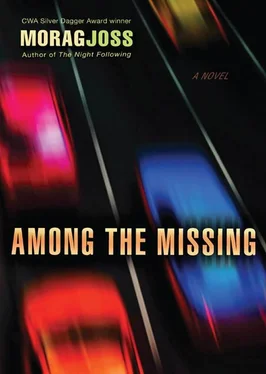
Vi was sitting at the stove with a shawl round her shoulders and a glass of red wine in her hand when Ron returned to the shop. She looked up from a magazine spread over the counter. Her eyes were sour and watery, and her mouth was puckered and stained dark with wine, like a patch of rot starting on a small, bruised piece of fruit.
“Cold out there,” Ron said.
“You’ll have to be quick, I’m closing early.”
“Where’s Silva?”
Vi pushed herself up a little in her chair. “Silva!” she yelled, then slumped back. “You come from the river?” she asked, swinging her glass toward the darkness on the other side of the window.
“You could say that.”
“Terrible thing.”
Ron wandered farther into the shop, looking at the shelves, sniffing gently as if he found the air, laden with kerosene and wine, too heavy to breathe.
“It’s self-service. Take a basket. Aye, terrible thing, that bridge.”
She gulped some of her drink and returned to her magazine. Ron brought a packet of biscuits back to the counter.
“Drowning your sorrows, then,” he said, placing a five-pound note on the counter.
“What’s it to you? Keeps the cold out,” Vi said, but she stood up and placed her glass out of sight under the counter. She put the bill in the cash register and started pulling coins out for the change, counting aloud, but her voice slowed. She stared at the money in her hand, dumped it all back, and started again.
“Can’t add up the day,” she said, trying to smile. She made another mistake, turned the coins from hand to hand, counted them into her open palm, and then dropped them. They fell rattling over the counter and cascaded onto the floor. Swearing, she ducked to pick them up and almost knocked over the stove as they rolled away. As she resurfaced, she swayed forward and gripped the back of her chair, but it screeched away from her and she nearly fell.
Ron looked over his shoulder. Silva was walking down from the back room with her bag on her shoulder, wrapping her scarf round her neck, smiling.
“That’ll be four pounds, twenty-five pence I’m owed,” he said, turning back to Vi.
“Well, it’s on the bloody floor. You’ll need to come back for it.”
“I’d like my change, please.”
Vi slammed the register shut. “You’ll have to come back the morn. We’re closed.”
“Come on, Vi, I’ll do it,” Silva said, moving behind the counter to open the register.
Vi shoved her away. “Don’t you touch my bloody money! We’re closed!”
Silva looked at her for a moment, then pulled her wallet from her bag and counted out four pounds, twenty-five pence.
“Here, take it,” she said to Ron. “It’s better not to argue with her. It’s all right, I got paid today. I’ll get it back tomorrow.”
“Sure? Well, thanks.” Ron took the coins and picked up his packet of biscuits. Vi was now back in her chair with her glass in her hand.
“Are you locking up, Vi? Want me to do it?”
“I’ll do it myself. In my own good time,” Vi said. She lifted her glass and swigged. “Go on, fuck off home.”
“Bye, Vi. Don’t fall asleep there, now.”
But Vi didn’t hear. She was bending into the shelf under the counter, looking for her bottle.
Outside, Ron lit a cigarette while Silva picked up the sandwich board sign and took it inside. When she came back, he nodded toward the Land Rover, and Silva clambered up into the passenger seat. As they drove off, Vi was staring out at them across the window display of faded boxes and dusty bars of fudge with her drink in one hand, waving with the slow, clawed fingers of the other. Ron pulled onto the road and turned left toward the bridge.
“Stop! What are you doing? This is the wrong way!” Silva said. “We can’t go over the bridge, we have to go to Netherloch. To the little bridge.”
Ron shook his head. “There’s a bottleneck at Netherloch. If we go that way it’ll be over an hour. This way you’ll be across in less than twenty minutes. You won’t even get your feet wet.” He smiled. “Don’t worry, I won’t make you row. Trust me.”
“Row? We are going in a boat? I can’t! I can’t go in a boat!”
“Why not? You want to swim?”
“I can’t swim!”
“Well, you’ll be better off in the boat then, won’t you?” Ron laughed, rolled down the window and threw out his cigarette end.
“I can’t go in a boat!”
The sudden rush of air from the window felt white and clear, like a beam of cold light. Silva was aware he had half-turned and was looking at her and at the same time was somehow, almost magically, keeping his attention on the road. He had careful, strange eyes; they traveled out and over her as she sat there, dissolving the shadows around her so that she might be unconcealed to him, fixed and memorized. She felt she was being recorded like a specimen, categorized as an example of something or other, but she had no idea what.
“You can go in a boat.” He spoke matter-of-factly, winding the window up. “You’ll be fine.”
For a while Silva stared ahead at the road until she felt safe enough, in the dark of the cab, to look at Ron again. She could see that his face was grainy with white stubble and his square, shaved head sat on his shoulders like a boulder on a ridge. Why had she agreed to this? She had no reason to trust him. The back of the Land Rover was dark but obviously not empty: every bump and curve in the road brought dull clunking noises from an uneven mass of vague, heavy shapes behind. There could be guns in there. Knives. Chains. Rope. Even with just a pickax and spade he could kill her and nobody would ever know. Or out there on the river in the pitch dark, he could push her overboard. She turned back and gazed through the window. Her body might be buried among the trees or under the dark hills or lost at the bottom of the river, and Stefan would never know where she was. Would Anna, growing up, explain her mother’s absence to other people with three words: she went missing ? It came to her suddenly that disappearance was worse even than death. Where were they?
“You’re not from round here,” Ron said.
“No.”
“But you’re not a tourist. Are you a student?”
“No.”
“Your husband. What sort of work was it you said he was looking for, again?”
“I didn’t say.”
He gave a short laugh and lifted his hands from the wheel for a moment, in mock fear. His eyes rested on her again.
“Okay. None of my business. Here we are, anyway,” he said, tapping on the steering wheel with straight, thick fingers, and turning off the road onto a gouged-out patch of land lit by a single orange light, bordered by a chain-link fence. He parked beside a security shed and got out, took a hard hat and a flashlight from the back of the Land Rover, and spoke a few words to the man at the shed window. The man snorted and shrugged, then handed another hard hat out through the window, which Ron told Silva to put on. The man came out and unlocked the gate in the fence.
“ ’Night, then, Ron. ’Night, madam,” he said, assessing Silva as she walked through. “Mind how you go.”
“She’s just going across the river,” Ron said.
The man laughed. “Hard hats must be worn at all times!” he called after them.
Ron led the way down a track of deep tire ruts, past giant machinery and stacked stone blocks and mounds of sand, silent under a misty glow from the moon. Bright electric light and music and men’s voices from other sheds at the far edge of the site spilled over the darkness. When they reached the jetty, Ron handed Silva the flashlight and swung himself down a metal ladder into a motor launch bobbing in the inky water. Silva handed over her bag and the flashlight, and he helped her down and onto a long seat that ran around the side of the boat. He started the motor, and at once, from somewhere among the sheds and piles of machinery, the barking and howling of several dogs rose into the air. The engine stalled. The barking grew louder and more vicious; two men shouted. Silva turned to Ron.
Читать дальше













